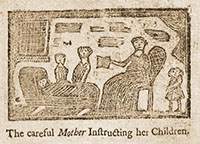 |
||||||||
|
||||||||
Kingwood |
||||||||
Hunterdon County, New Jersey |
||||||||
Home of the George and Mary Fox Family |
||||||||
Historical Collections of the State of New Jersey by John Warner Barber, Henry Howe, published by Pub. by B. Olds, for J. H. Bradley, 1852
|
||||||||
|
This township was formed in 1798. It is about 14 miles long, 4 wide, and is bounded NW. by Alexandria and Bethlehem, SE. by Delaware and Raritan, E. by Clinton, and W. by the Delaware river. . . The tract known as the "Great Swamp" extends into the township. One would suppose from the name that this region was covered with bogs and fens, but it is the dead level of the surface, which at certain seasons retains water, that has given rise to the name. . . The beginning of any local interest of the Baptists in this place [Flemington], as nearly as can now be ascertained, is as follows:—In the year 1765, Thomas Lowry and James Eddy gave a piece of land, about half an acre, for a Baptist meeting-house. This lot lies on the northeast corner of the main street, and the Now Brunswick and Somerville roads. The house was built in 1766, under the direction of Thomas Lowry, James Eddy, Gershom Lee, Jonathan Higgins, John Jewell, Esq., and others. This was the first Baptist meeting-house in Amwell township, which at that time, together with the adjoining township of Kingwood, was a part of Bethlehem; and latterly, Amwell being divided, now makes the house stand in Raritan. There being no regularly constituted church, it was called the Baptist meeting of Amwell, and chiefly supplied with preaching by the neighboring ministers. David Sutton, pastor of Kingwood, supplied them some time during the revolutionary war, but he, though a very pious minister, was by Mr. Jewell shut out of the house, because he was thought to be too favorable to the British. About this time the American soldiers used the house as barracks and hospital, the marks of their firearms being visible on the floor not twenty years ago. After this, Nicholas Cox, a minister of considerable talent, then at Kingwood, supplied a part of his time regularly, but in 1790/91, declared himself a Universalist. This gave a general shock to their interests for some time, and they had very little preaching for four years. Then Mr. J. Ewing, pastor of Hopewell, supplied them ten months. In 1795, G. A. Hunt, pastor of Kingwood, engaged with them for one third of his time. At this period the house was almost in ruins. Their circumstances becoming more auspicious, the house was repaired, and in June, 1798, there were fifteen persons constituted into a regular Baptist church, called the Baptist church of Amwell. They now elected their deacons, their clerk, and a board of trustees. . .
|
|
||||||
|
A History of Baptists in New Jersey by Thomas Sharp Griffiths, published by Barr Press Pub. Co., 1904 .. .For the origin of this church, we must look back to 1722. When the tract began to be settled by persons, some of whom were Baptists; five of them. Three other Baptists came, in 1734. Mr. Thomas Curtis, a licentiate and a student at Hopewell (possibly a licentiate of Hopewell church). At Kingwood he and the aforesaid Baptists built a small meeting house. The first fruits of his ministry went to Hopewell for baptism. In 1748, James and John Bray and his wife, members of Middletown (living at Holmdel), sons of John Biay who built the third house of worship and parsonage at Holmdel in 1705, arrived, which increased their number to twelve souls. Mr. Curtis visited the lower part of the township (now Kingwood) where another meeting house was built in 1741 on the spot where the present one stands. Here five were baptized by Rev. Joseph Eaton of Hopewell. His next converts in the lower tract were baptized by Rev. Thomas Davis, who succeeded Mr. Eaton at Hopewell. This increased the Baptists to twenty-two and made them think of becoming a distinct society. Having obtained release from Hopewell they were constituted a church July 31st, 1742. Mr. Curtis was ordained for pastor October, 1745. He died in April, 1749. . . .Both Seventh Day Baptists and Dunkards (feet washing Baptists) had colonies nearby and were aggressive to win proselytes. More, in the seventeenth and eighteenth centuries, new things of doctrine and of opinion were welcomed by good people as never before. . .
After many years Rev. David Sutton entered the pastorate in in 1764, remaining till August, 1783 and proved himself sent of God. Morgan Edwards says of him:
Mr. Sutton was a son of John Sutton, a constituent of Scotch Plains church. He was a missionary pastor. In 1764, the year of his settling at Kingwood, he made an appointment at Flemington and no doubt influenced Messrs. Lowry and Eddy to give in 1765, (the next year) the lots on which to build a Baptist meeting house; he secured the erection of the house of worship in 1766, within two years of his coming to Kingwood and in his long charge at Kingwood, nearly twenty years preached in the house at Flemington. He was thus the first Baptist preacher at Flemington and laid the foundation for the later growth of Baptist interests there. |
|
||||||
|
||||||||
|
©Roberta Tuller 2025
|
||||||||

